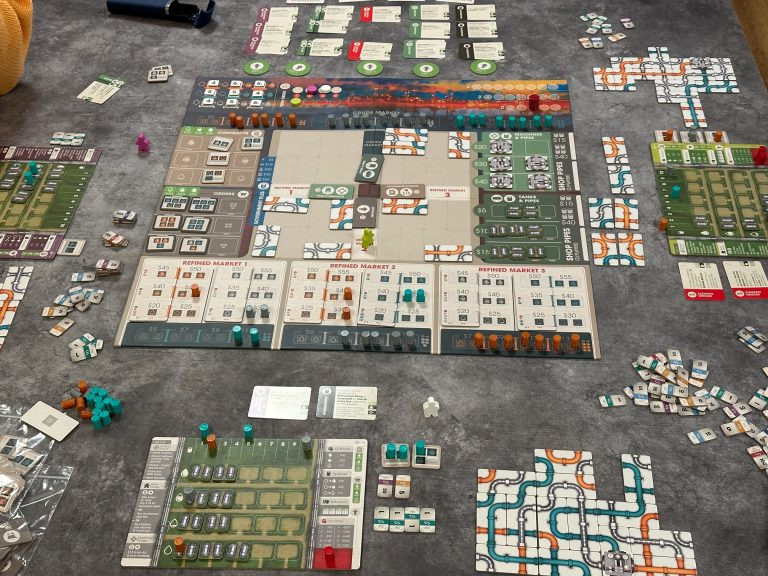

Disclaimer: I wrote this review and then submitted it to ChatGPT to see how it would write the review. This is the ChatGPT text; It’s a little flowery, in my opinion.
Pipeline, a captivating creation by Capstone Games, stands proudly on the gaming shelf alongside CO2: Second Chance and Offshore. This challenging yet gratifying experience revolves around the intricate world of oil refinement, offering players the opportunity to immerse themselves in the roles of designers and managers of an oil refining enterprise.
At the game’s core lies an elaborate oil refinery, constructed using carefully chosen pipe tiles. These tiles are strategically placed to maximize the lengths of differently colored pipes, aligning with the three distinct oil barrel colors. The objective is to refine crude oil stored in tanks on the player board, transforming it into higher-quality variants for lucrative market sales.
Pipeline extends beyond a mere exploration of tanks, oil, and a refinery; it evolves into a dynamic worker-placement game. Each player maneuvers a single worker to execute a range of actions, with ten choices available at most times. Four actions grant access to crude or refined oil markets, while others involve securing loans, acquiring contracts, purchasing tanks, pipes, machines, and various upgrades for the business and refinery.
Strategic decision-making becomes paramount, with players facing dilemmas of whether to invest in upgrades or machines for automated refinery operations. Navigating cash flow challenges adds an extra layer of complexity, requiring careful financial planning. As the game progresses, acquiring contracts gains significance, offering an alternative revenue stream without the need for market visits.
Pipeline unfolds over three “years,” each with diminishing rounds, emphasizing the importance of efficient actions. Players must balance income from refined oil, manual refinery operations, and fulfilling contracts and orders. The distinction between orders and contracts introduces strategic nuances, as each option presents unique advantages.
Ultimately, Pipeline hinges on a player’s ability to optimize their oil company, including the meticulous arrangement of pipe tiles in the refinery. There are no frivolous or redundant actions; every decision contributes to the success or failure of the enterprise.
A notable element in the game is the endgame valuation scoring, where money equates to victory points. Company valuation is derived from unsold oil in tanks, productive pipes, and other factors, with additional variables introduced through randomly drawn cards. This scoring mechanism, while somewhat commonplace, adds a layer of strategic foresight to the game.
Pipeline introduces subtle complexities, particularly regarding minimum pipe lengths for oil refinement and dynamic market fluctuations. The game’s pace quickens as cheap oil depletes, making room for more expensive variants, influencing market dynamics and pricing.
Overall, Pipeline offers a gameplay experience that may seem intricate initially but reveals a manageable level of complexity after a short learning curve. Players familiar with medium-weight games can swiftly grasp its mechanics, with beginners benefiting from experienced guidance.
The game’s thematic appeal may not resonate with those seeking a narrative-driven experience, but for enthusiasts drawn to the satisfaction of solving puzzles, constructing intricate systems, and reaping financial rewards, Pipeline delivers a fulfilling experience.

In a recent playthrough with two other participants, one experienced and one new to the game, I employed a strategic approach. Acquiring crude oil and strategically placing pipes to refine and sell oil formed the foundation. Upgrades, including enhanced pipe effectiveness and the ability to take a second action for free, augmented my efficiency.
The pivotal decision to invest in a machine for automated refinery operations significantly improved my gameplay. Balancing contracts, refining capabilities, and market dynamics, I maintained positive cash flow and fulfilled contracts with precision. In the game’s final stages, leveraging valuation cards and strategic pipe purchases resulted in my best score to date—$1037.00, doubling my previous record.
The accompanying image showcases the game’s progression a few turns before the end, featuring my player board at the bottom. Focused maneuvering in the final turns allowed me to fulfill two lucrative orders, contributing substantially to my impressive final score.
